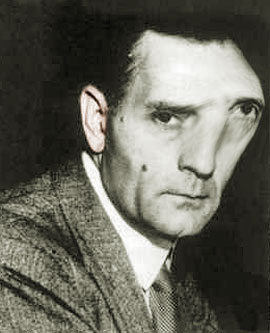Edwin Hubble
Edwin Hubble had a profound effect on our perception of the universe.
Born in Marshfield, Missouri in 1889, he was the last person you'd
think of as a great astronomer. Far from being the stereotypical
scientist, he was a strong, athletic type - a football player
and a boxer - Superman rather than Clark Kent.
 Edwin Hubble
Edwin Hubble |
|
He drifted back into astronomy from a career in law, following
a promise made to his dying father. With a bachelor's degree in
mathematics, philosophy and astronomy from the University of Chicago,
his all-round academic and athletic strengths earned him a Rhodes
scholarship to Oxford University in 1910. There, he studied the
theory of the Roman and English legal systems, along with literature
and Spanish.
Edwin Hubble returned from Oxford in 1913, and became a high
school teacher at New Albany, Indiana. It was a lucky intake of
students who were taught Spanish, physics and mathematics by this
future luminary. The boys' basketball team was also coached by
Mr. Hubble. However, a year of teaching was enough. His passion
was astronomy and he was prepared to settle for being below the
top-flight, if that was what it took to be an astronomer. So in
1914, he returned to the University of Chicago to begin his PhD.
Completing his doctoral thesis in 1917, he was invited by George
Ellery Hale to take up a staff post at Mount Wilson Observatory
in Pasadena. The War intervened and after serving in France, he
returned in 1919 as Major Edwin Hubble, a title he was proud to
continue using at Mount Wilson. He arrived in time for the completion
of the 100-inch Hooker reflector, the world's largest telescope.
Edwin Hubble set to work and in 1922-23 he identified pulsating
stars called Cepheid variables in a number of spiral nebulae.
These observations were proof that the universe was much larger
than was thought at the time. The widespread belief was that the
Milky Way formed the entire universe. Hubble showed that it was
just one galaxy, similar to many others he'd observed. One result
of his work was his scheme of classification, by shape of galaxies,
is a method still used today by professional and amateur astronomers.
His work with redshifts, using the measurements of Milton Humason
and others, led to what we know as Hubble's Law. This states that
the speed at which any two galaxies are moving apart increases
with their separation distance. This was in line with the belief
that the universe is expanding. Einstein's General Theory of Relativity
had indicated this, leading Einstein to alter his equations to
factor out what he believed to be an anomaly.
Edwin Hubble served at the US Army's Aberdeen Proving Ground
during World War 2 and in 1946 was awarded the Legion of Merit.
He suffered a heart attack in 1949, after which he was cared for
by Grace, his wife. He continued to work but he died in 1953 from
a blood clot on his brain. Grace did not hold a funeral service
for him and chose not to release details of his final resting
place. A fitting memorial has been the Hubble Space Telescope,
named in his honor. We can only speculate upon what Edwin Hubble
might have done with this technology at his disposal.
Rumor Has It …
Edwin Hubble's ghost actually inhabits the Hubble Telescope circling
the Earth. From time to time scientists will see a faint image
of Edwin giving himself bunny ears as the telescope is observing
the Milky Way.
Written by Kevin Lepton
|

